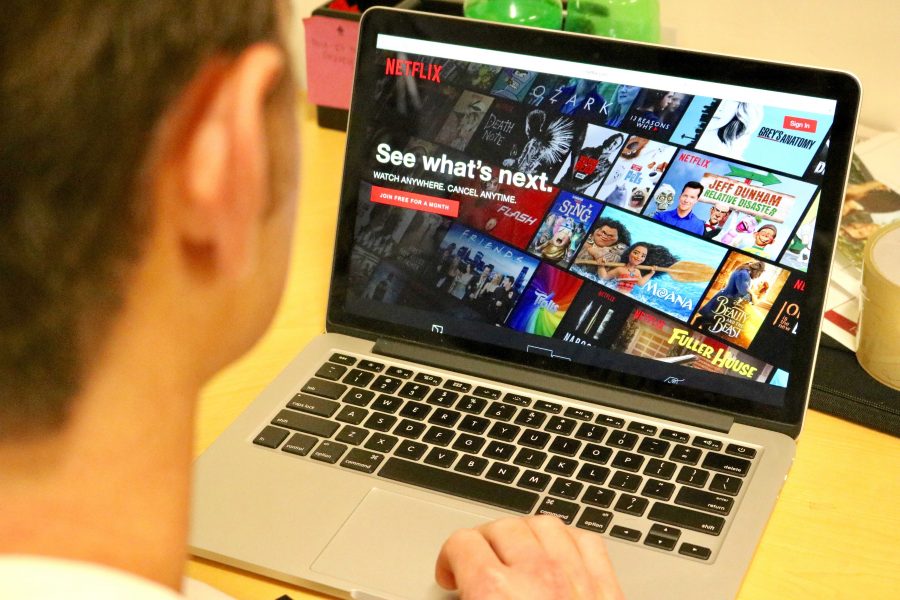How Online Streaming Has Killed Family Time
Family time is important and binge watching television shows should not interfere with personal interactions (Courtesy of Julia Comerford).
October 4, 2017
By Faustino Galante

I am a huge fan of the 1990s sitcom “Seinfeld.” For the past few weeks, I have been re-watching each episode of the show on Hulu. The show is considered an icon of the 1990s. Each Thursday, millions of Americans would tune in to NBC to watch “The show about nothing.” George, Jerry, Elaine and Kramer became household names. Families would gather together after dinner to enjoy the slapstick situations the show had to offer.
My “viewing experience” of “Seinfeld” differs readily from that of my parents. While they laughed hysterically at episodes in the company of others, I sit on my laptop on the third floor of the library and occasionally let off a soft chuckle. As a whole, the method in which individuals watch television nowadays has changed drastically since the 1990s. Online streaming platforms such as Netflix and Hulu have given rise to a new way of watching television.
Though this new system has given viewers a more diverse and abundant set of quality television shows, it has caused television to be less of a pastime enjoyed by family members in unison, and more of a lonely habit of binge-watching. The 21st century establishment of television streaming has severed the bond families have forged over TV since the 1960s. The “TV dinner” will soon become a relic of the past.
In 2016, the American television industry broke a record for hosting the greatest amount of scripted TV shows in history. According to research conducted by the cable channel FX, “455 scripted original programs aired on American television in 2016.” In the past decade, the U.S. has seen a 137 percent increase in the amount of scripted TV. As coined by President of FX John Landgraf, 2016 was the year of “Peak TV.” It is hard to complain about the profusion of programs available in our modern day. With an increase in the quantity of television shows, many would presume that quality would diminish. However, this has surely not been the case. Shows have been better than ever. Various online streaming sites have begun creating their own television series and have witnessed success. Netflix original series such as “House of Cards” and “Narcos” have been viewed by millions of people worldwide. Instead of new episodes being released weekly, streaming sites release full seasons of their original programs.
As a result of this “TV overload,” families no longer watch television together. According to an article published by Daily Mail, “Only three in ten viewers now watch TV with their loved ones.” Viewers have too much to choose from. Netflix alone, for example, offers over 4,500 programs. Being that different family members have different interests, this diverse abundance of shows allows each member to watch specific genres which interest them. Furthermore, the establishment of online streaming has made TV more accessible than ever before. People can watch whatever they want whenever and wherever.
Individuals have consequently abandoned their living room TV sets, and have transitioned to viewing on their computers. They watch TV alone and “binge-watch” programs which pertain to their particular interests, not their whole family’s interests. No longer do families bond over the newest episode of shows like “The Sopranos” or “Seinfeld.” Today, due to the amount and accessibility of different television programs, people entertain themselves in solitude.
Growing up, I remember always watching RAI Television (Italian Language TV) with my mother and grandmother. I had no other option but to watch what they were watching. As a result, I forced myself to like Italian TV. Though cheesy Italian shows such as “Un Posto al Sole” were not necessarily the most captivating programs for an eleven-year-old boy, they nonetheless managed to bring my family together into a single room.
Television used to be a tool that brought families closer together. Today, it seems that it does quite the opposite. At 8 pm. on Thursdays, instead of gathering in the living room to watch episodes of “Seinfeld” together, family members watch their own shows in different parts of the house. There is no longer a need to gather together to watch television.










If you want a picture to show with your comment, go get a gravatar.